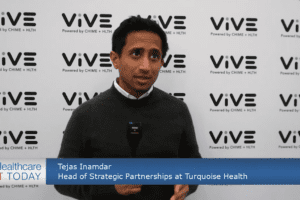Demonstrating once again that for health systems, it’s the data, stupid, fourteen US health systems have come together to sell anonymized versions of the vast stores of patient information they collect and maintain.
The group, which is led by the Providence system, also includes AdventHealth, Advocate Aurora Health, Baptist Health of Northeast Florida, Bon Secours Mercy Health, CommonSpirit Health, Hawaii Pacific Health, Henry Ford Health System, Northwell Health, Novant Health, Sentara Healthcare, Tenet Health and Trinity Health.
The health system partners will structure, normalize and de-identify their data using a new platform leveraging AI and machine learning technology. (The group doesn’t identify a technology vendor in its announcement, so it’s likely that the platform will be proprietary.)
To sell the data, the systems have formed a new venture, dubbed Truveta, which according to a Bloomberg article will bring together records representing roughly 13% of all US hospitals. If this stat is anywhere near correct, it represents that kind of volume that could truly be a game-changer for the industry. The group says the sheer scale of its efforts is one of its key benefits, as its combined population – which cuts across 40 states – will better represent diverse populations than other data-sharing efforts.
In taking on mass-scale data sharing, unapologetically and loudly, the group does assume some reputational and even legal risk. To date, it’s been difficult for healthcare organizations to accumulate and share data, anonymously or not, without attracting unwelcome attention or even potential regulatory sanctions.
For example, Google and the Ascension health system were well into a data-sharing effort known as “Project Nightingale” became the target of an investigation by the HHS Office for Civil Rights in late 2019. The investigation, which is examining whether the big G met HIPAA requirements when pulling together millions of Ascension patient records,
More recently, fertility-tracking app Flo Health recently settled with the FTC over allegations that it engaged in inappropriate sharing of user data. According to the FTC, the company shared health information on its 100 million users with third-party data analytics firms despite promising that this data would remain private.
From an industry standpoint, Google and Ascension’s activities are easier to explain than those Flo Health addressed in the FTC settlement agreement. Regardless, privacy advocates are likely to challenge deals like the one announced by the 14 health systems somewhat vigorously. The truth is that the things which make this effort valuable to the healthcare industry – notably, the comprehensive nature of the records – can also pose a threat to consumers if the data isn’t managed appropriately.
Regardless, ventures like these are becoming a fixture of the industry. As I’ve noted previously, providers are going to make every effort to monetize the data they collect, for in a very real sense, health data management is as much their core business as delivering care. Although, they do stand in contrast with efforts like the one NVIDIA did with multiple hospitals across the country. In this AI model, NVIDIA left the data at the healthcare organization and only the learnings were shared. This made it much easier to do since the data never left the hospital, just the AI learnings.
Let’s hope Truveta manages to keep its reputation spotless as it moves forward. If the way it manages and shares data doesn’t sit well with consumers or regulators, it’s not too big to fail, and such a failure could have negative repercussions for the healthcare industry as a whole. The last thing we need is for a health system juggernaut to face privacy questions at such a pivotal moment in the evolution of health data exchange.













